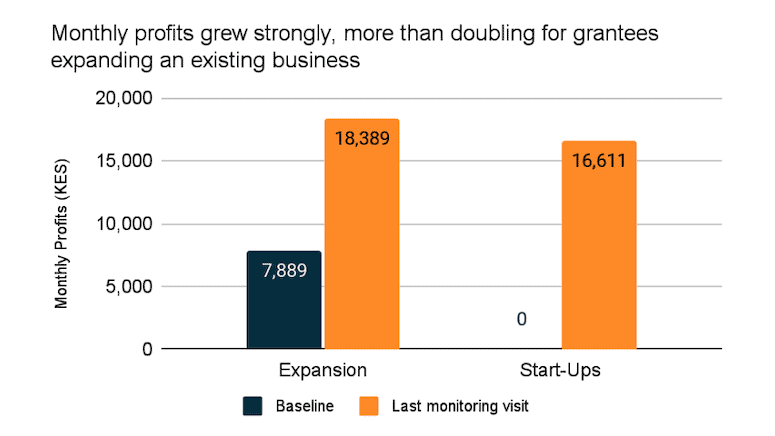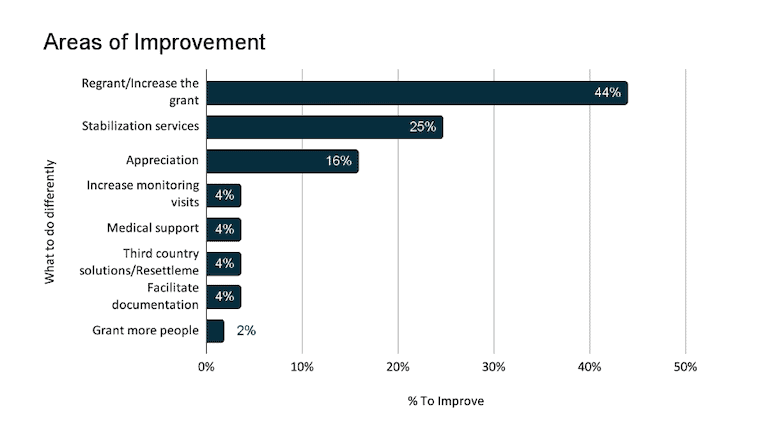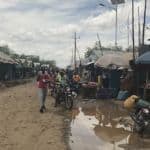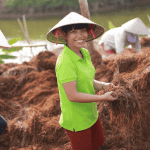Building Businesses, Rebuilding Lives: A Holistic Approach to Supporting Refugee Entrepreneurship
Chantal and her family were forced to flee from their farm in the eastern Democratic Republic of Congo (DRC) by an outbreak of unrest in 2015. She and her young brother were separated from their parents and had to walk for long stretches with little food or water. The siblings survived being shot at by members of armed groups as they fled. After an arduous journey that took them through two neighboring countries, Chantal and her brother finally arrived in Kenya, settling in Nairobi.
But even with the turmoil of DRC far away, life in Nairobi posed new challenges, from securing safe and affordable housing, to finding consistent work — and even surviving a tragic fire that destroyed the new home they’d found. Years later, Chantal and her family are finally working towards becoming self-reliant in their adopted city, as she now owns a successful hair-dressing salon.
For refugees like Chantal, running a business has been a big part of their efforts to rebuild their lives. Though they owe their success mainly to their own incredibly hard work, RefugePoint‘s comprehensive support — including housing, food and healthcare — aims to provide them with the stability and foundation they need to focus on their businesses. In Chantal’s case, this support included entrepreneurship skills training and a grant from our Livelihoods program, which are further helping her and her household along their path towards self-reliance. We’ll discuss this program below, exploring what it has taught us about the benefits of refugee entrepreneurship initiatives — and how to maximize this impact.
Refugee entrepreneurs making a profit
Chantal is one of hundreds of refugee entrepreneurs who have participated in RefugePoint’s Livelihoods program in Nairobi, where the organization provides direct services to urban refugees. She’s a great example of how the program can support the efforts of refugee households to generate business income and develop self-reliance in their country of asylum.
The program includes a week-long business skills workshop, a grant, business mentoring, and support to access needed information, business permits and financing. In Chantal’s case, her grant of about KES 42,000 (about US $320) allowed her to put her existing skills as a hairstylist to use, starting up her own salon and barbershop. When she first got started, her profits were slim: only about KES 3,000 per month ($23). But that steadily climbed up to KES 15,000 ($114) a month, accounting for about 75% of her household’s total monthly income.
RefugePoint recently crunched the numbers provided by all refugee entrepreneurs who received a first-time grant in 2022, the year Chantal set up shop. Our analysis shows that Chantal was one of many grant recipients who generated business profits that helped them move towards self-reliance. Our program supports both refugee entrepreneurs who want to scale-up an existing business, and those who are starting a new business, like Chantal did. These entrepreneurs are active in businesses ranging from salons and barbershops, to clothing and textile shops, and stores selling prepared foods, electronics and much more. As seen in the figure below, both new and established entrepreneur grantees saw strong growth in monthly profits from the time they entered the program to their last monitoring visit (which usually happens six months after they receive a grant).

Note: n = 80; RefugePoint Livelihoods Assessment Data
For both groups of grantees, average monthly profits were around KES 17,000 – 18,000 (about $129 – 137) by the last monitoring visit. These profits may seem modest, but they’re still very meaningful for these entrepreneurs and their families. To put this in context, the average monthly household income for all grantees was only about KES 13,000 ($99) at the baseline (i.e., the period before they launched or expanded their business). For both groups of entrepreneurs, business profits bring in the majority of their households’ overall income. In addition to supporting their own households, a small group of grantees managed to grow businesses that also provided employment opportunities to others. Some 11% of grantees who responded to our questionnaire told us they now employ 10 or more people.
Of course, not every refugee entrepreneur experiences business success, especially not right off the bat. Among our grantees from 2022, more than a few changed their business model completely — or closed up shop altogether — in the face of challenges like a tough economy, illness in the family, difficulty finding a good location for doing business, theft, or negative interactions with city officials. Still, our follow-up research with the 2022 grantees found that 56% of respondents had still managed to meet the goal they set out to achieve with the grant they received.
Getting the refugee entrepreneurship support model right
Respondents to our inquiry also shed light on what they appreciated most, and least, about RefugePoint’s Livelihoods program. They were enthusiastic about the program overall, with two out of three saying they were satisfied “to a very large extent” with the support they received. They highlighted some strengths of the program, which included the business skills workshop itself, and the grants, which could reach as much as KES 80,000 ($608). They also suggested some areas for improvement, which are summarized below. Among these, the most common suggestion was to increase grant amounts further and expand opportunities for follow-up grants. Better access to services to help refugee households stabilize their situation in their country of asylum was also a common suggestion, with one out of four respondents mentioning it.

Note: n = 57; RefugePoint Livelihoods Participant Follow-Up Survey
A holistic approach to achieving refugee self-reliance
These responses help show how important entrepreneurship support is to RefugePoint’s holistic approach of partnering with refugees to achieve, and maintain, self-reliance while they remain displaced. Self-reliance is about stabilizing refugees in the countries they’ve fled to, and working with them to rebuild the social and economic assets they need to meet their basic needs. Refugees overwhelmingly don’t want to depend on humanitarian aid or handouts. They would rather use their skills, smarts and work ethic to improve their situation and that of their families and communities, and to take control over their new lives.
RefugePoint plays a unique role in helping refugees stabilize their lives and build greater self-reliance. Usually, the first step is to provide stabilization services like housing, mental health counseling, food support and health care. We then look to connect refugees with opportunities to support themselves and their households — for example, through the Livelihoods program and the business skills training and small business grants it offers. Among that program’s grantees from 2022, some were eligible for stabilization services while operating their businesses. Others, who we assessed as already being more stable and secure, were not eligible for these services during their experience in the Livelihoods program. Receipt of these additional services could have a bearing on the profitability of these refugee-owned businesses, though our sample is not yet large enough to explore this further.
Even in the best of times, running a business is challenging, and entrepreneurship isn’t for everyone. But for refugees with a bit of a flair for business, and the grit and determination to put it to use, building a business can be a key step towards rebuilding their lives in a new country. RefugePoint is proud to partner with refugee entrepreneurs like Chantal through the Livelihoods program to take a few critical steps on their journey towards self-reliance together.
For more information, please contact:
Jacinta Mutie, Monitoring, Evaluation And Reporting Manager: mutie@refugepoint.org
Paul Karanja, Urban Refugee Protection Program Coordinator: karanja@refugepoint.org
Patrick Guyer, Associate Director for Monitoring, Evaluation and Learning: guyer@refugepoint.org
Jacinta Mwikali Mutie is Monitoring, Evaluation And Reporting Manager, Paul Karanja is Urban Refugee Protection Program Coordinator, and Patrick Guyer is the Associate Director of Monitoring, Evaluation and Learning for RefugePoint.
Photo credit: UN Women/Ryan Brown
- Categories
- Education



